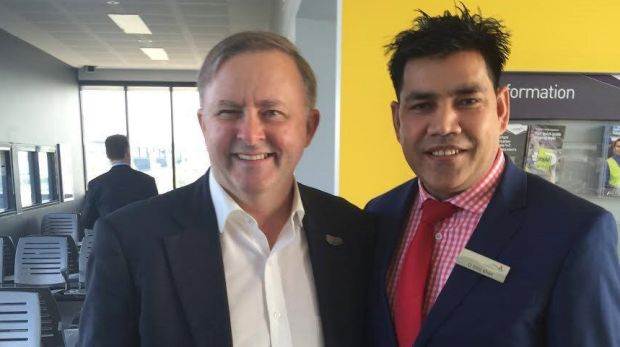Intaj Khan leaves the red Ferrari in the garage these days. For an aspiring Labor politician from Melbourne's battling outer west, the car was generating too much fuss.
The 43-year-old Wyndham councillor attracts plenty of attention anyway.
More National News Videos
Intaj Khan is hard to ignore
Wyndham councillor Intaj Khan is under pressure over land, business & Labor deals.
In a few years he has built a $70 million fortune, his wealth coming from a controversial private training college and contentious, large-scale property speculation in his own fast-growing municipal patch.
And then there's the house.
Khan has unveiled plans for a $10 million Tarneit mansion – probably the largest private residence in Melbourne's west – to feature 16 bedrooms, two swimming pools, a tennis court, a 30-seat home theatre, a seven-car garage and a helipad.
His critics say the "Intaj Mahal" is a monument to excess from a man who is almost certainly Victoria's richest local councillor.
Khan says it's a celebration of migrant achievement in Australia. And after all, he could have built in Brighton or Toorak. "If the area is disadvantaged or poor you stay there when you make some money. If you love it, it's like your mother; you stay with it."
Khan is eyeing the Wyndham mayoralty and has been accused in state parliament of bankrolling a small army of dummy candidates at next month's council elections to help secure it.

He readily acknowledges he also wants a seat in parliament.
Khan's impatience for wealth and power has increasingly put him on the radar of those who could frustrate such ambitions.

He has endured investigations of his Western Institute of Technology, which has been criticised over mistreatment of workers employed on 457 visas and a highly critical report on its teaching standards by a federal regulator.
Then there is an ongoing ALP probe into branch stacking which could cause Khan further headaches after a surge in new, mostly Indian-background members, out west and elsewhere.

Now inquiries by the Sunday Age have uncovered repeated failures by Khan to properly declare property and commercial interests, as required by the Local Government Act, including large swathes of farmland.
The failures raise serious probity concerns for a fast-growing urban fringe council that works closely with state governments to turn humble farmland into housing estates, generating vast riches for landowners.

His problems also highlight the challenges for migrants grappling with a new political culture that, publicly at least, eschews ostentatious displays of wealth.
But so too do the challenges of brash newcomers like Khan to a system already struggling to live up to its own claims to good governance.

In a corner of a McDonald's outlet in the far western frontier, Intaj Khan looks both in place and out of it.
Indian born and raised, he arrived in Australia in 1998. His fine black suit, scarf and Rolex contrast with the scene beyond – bulldozers turning paddocks into neighbourhoods for a young, mostly migrant, community.

After gaining a bachelor in engineering technology from the University of Central Queensland, Khan founded the Western Institute of Technology (WIT) in 2008.
It specialised in building courses for both local and international students from three campuses: Maidstone, South Melbourne and Dandenong. The company website claims a campus at Caroline Springs but this is not accurate.

By 2012 the institute would boast a turnover of $14 million and was ranked 14 on the BRW list of the 100 fastest-growing companies in the country.
Important to the business has been Victorian government grants of up to $5 million a year, funding that is now in jeopardy as the Andrews government undertakes greater scrutiny of a heavily-rorted sector.

Khan says state ambivalence to private training colleges means this business will suffer. It has helped firm his view that it's time to move on.
"I enjoy real estate more," says Khan. "There's too much regulation in education."

The cash flows from his training business has allowed Khan to borrow and invest in property, mainly speculation on farmland.
It has paid off in spades. He now claims a $40 million property portfolio. Title searches show several substantial, multi-million dollar land purchases around Wyndham.
Such investments by a local councillor – he has the council's economic development portfolio – with privileged access to planning intelligence are legal, but highly sensitive.
Under local government laws, checks and balances intended to prevent misuse of information by councillors and staff include the requirement to twice-yearly declare property and corporate interests andto declare conflicts of interest during council decision making.
Khan has repeatedly failed to fully declare his property and corporate holdings in his register of interest returns. The Sunday Age has pieced together a list of the properties Khan and related companies have owned since he was elected to council in 2012.
Matched against his twice-yearly register of interest returns, the analysis points to at least 25 breaches, each breach subject to a fine of more than $9000. Tallied, it points to a total of more than $200,000 in fines if action were taken by authorities.
"It's all declared, all declared," insists Khan when the Sunday Age first raises the gaps in his returns. "I've got nothing to hide."
But over coffee at McDonald's, Khan's beaming smile turns down and his shoulders begin to slump as is unable to explain why he failed to declare property interests identified by the Sunday Age.
So too has Khan repeatedly failed to declare directorships in companies. For one six-month period – late 2013 to early 2014 – Khan failed to lodge any returns at all.
While councillor obligations are complicated in some areas of their work, the requirements for register-of-interest returns are simple. "It's ABC really," says local government law specialist, Terry Bramham. "It's a straightforward matter of transparency and accountability."
Bramham, from Macquarie Local Government Lawyers, says accountability is especially important in areas like Wyndham where councillors are managing urban growth and their daily decisions and advice to the state government can generate massive windfalls for landowners and developers.
Khan eventually acknowledges he has probably failed to declare property and other interests. "My intention has never been to hide things. Just an error I would say."
Chief municipal inspector David Wolf said it "routinely" reviewed council register of interests, and said it has required details to be updated and issued warnings to councillors for failing to disclose conflicts.
Wyndham's manager council and community relations, Emily Keogh, said it was the "responsibility of the individual councillor to ensure compliance" by declaring their interests.
Khan insists he has always appropriately declared conflicts when they have arisen in council meetings. He called for a modernising of councillor disclosures so that the register is on line and publicly accessible.
Asked if he wants to be mayor, Khan says he doesn't, explaining he is too busy.
But if his colleagues called upon him? "I would consider it. If I was to be mayor I'd change the city to business progressive city. We need jobs here."
To become mayor you need first to win the election and then to gain the support of your fellow councillors. It helps if they are friendly.
Liberal backbencher Bernie Finn, in parliament last month, claimed Khan was set to run dozens of candidates in the upcoming council elections.
He called for the local government inspectorate to "keep a very close eye" on Wyndham and in particular on Khan.
While Khan skirts the issue of dummy candidates, he acknowledges he is encouraging and helping young friends contest next month's council election. (Nominations for candidates across the state opened on Thursday and close this Tuesday.)
Already several candidates linked to Khan have nominated. As for state politics, Khan openly acknowledges a keen interest in the seat of Tarneit, currently held by veteran MP and speaker Telmo Languiller.
"Once Telmo retires it would be good to serve the people where you live."
But to win preselection means having the numbers. When former prime minister Julia Gillard retired from local federal seat of Lalor in 2013, ALP membership in her seat was around 120. Membership has exploded and is now upwards of 500.
Hundreds of applications are now under a cloud as the ALP investigates in what appears to be a massive branch-stacking exercise – in the west and elsewhere – involving the electronic signing up of members of predominantly Indian background.
Khan – who joined Labor in 2010 and is loosely aligned with the left faction – denies being involved.
As for his mansion, Khan is confident work will start soon.
There have been delays due to getting approval for the helipad; there have been some minor hold ups over Aboriginal heritage and there is a "small" dry stone wall that has raised some concerns.
"But it's on track. We've done everything by the rules."
Do you know more? Contact us securely via Journotips















